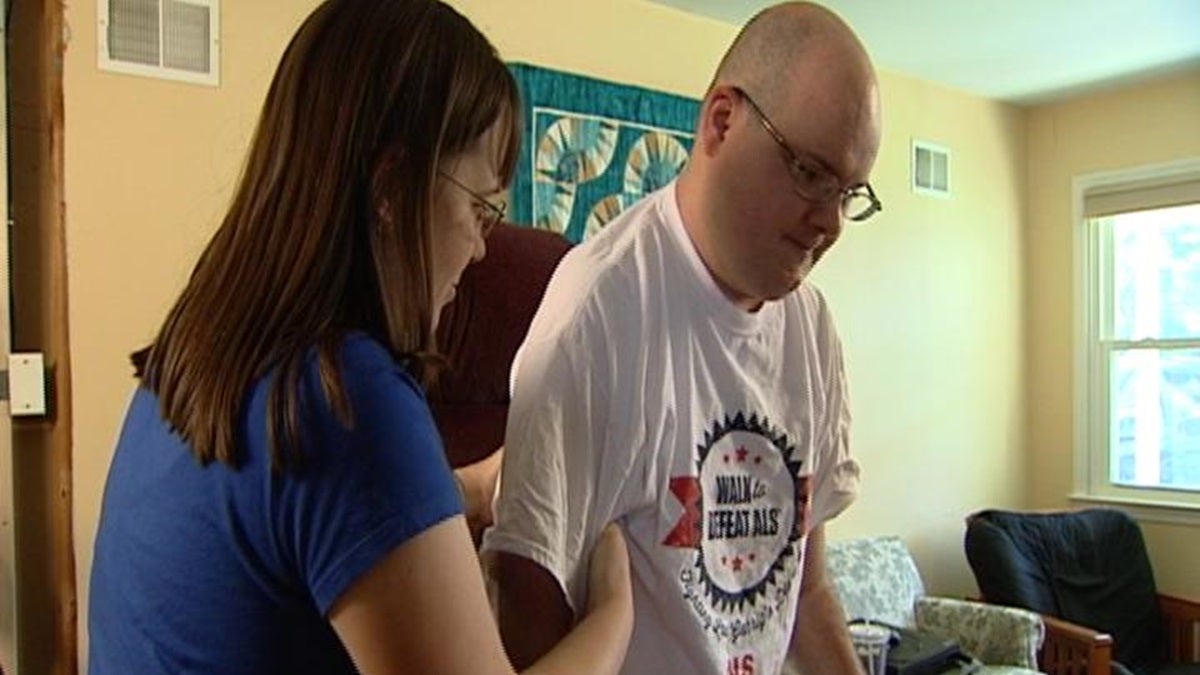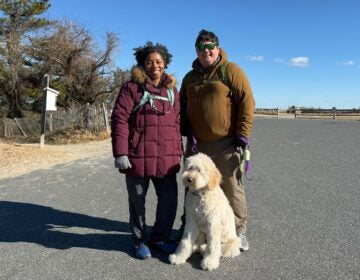Delaware ALS patient encouraged by Ice Bucket Challenge

Chuck Morris gets help moving into his chair from his wife Christina. Chuck was diagnosed with ALS four years ago. (Gary Lindstrom/WHYY)
While it might seem like another passing social media fad, those diagnosed with ALS are grateful for every ice bucket.
The ice water buckets are everywhere, with thousands dousing themselves to raise awareness and money for amyotrophic lateral sclerosis, also known as Lou Gehrig’s Disease.
Over the past few weeks, videos of friends and family doing the “Ice Bucket Challenge” for ALS have flooded social media. With every bucket, another challenge is issued. The grass-roots effort has taken a high-profile turn with celebrities, sports teams and politicians, such as Delaware Gov. Jack Markell, getting doused.
Big money
But it’s more than just a lighthearted viral trend: The challenge has dramatically increased donations for the ALS Association.
“It’s raised over $15 million since this campaign began in late July, and it continues to grow,” said Tony Heyl, communications and public policy director for the ALS Association of Greater Philadelphia, which includes Delaware.
Heyl said ice bucket challenge videos have come in from all over, including international locales like Turkey and Iceland. ALSA staff even had to help international donors navigate their website to make contributions through the challenge.
Those donations will help the ALS Association assist the approximately 100 ALS patients in Delaware, including Chuck and Christina Morris of Newark, who learned that Chuck had ALS four years ago.
“I had just found out that I was pregnant with Katie actually,” Christina said, referring to the couple’s daughter, who is now four years old.
“It was terrifying,” Chuck said of the diagnosis. “I quite frankly didn’t know if I would see Katie or be able to hold her.”
For safety reasons, Chuck had to leave his job at the Delaware Dept. of Corrections. He had been working as a counselor at Wilmington’s Howard R. Young prison, and it was during his workday that he first experienced a stiffness in his leg muscles that eventually was diagnosed as ALS.
The father of four is now dependent on others to do the most basic tasks.
“Most of the things that people take for granted, that you just do for youself, scratch an intch, wipe your eye, blow your nose, feed yourself, take yourself to the bathroom, all of those things, someone else has to do for him now,” Christina said.
‘Of course it’s dumb’
While the whole family’s life has drastically changed since the ALS diagnosis, watching friends, family and even strangers make an effort to raise money and awareness for the disease brings big smiles at the Morris house.
“Just watching the videos is an encouragement to me,” Chuck said.
There’s plenty of naysayers who are critical of the web phenomenon, but Christina said that people shouldn’t be deterred.
“Some people say, ‘That’s such a dumb thing to do.’ Of course it’s dumb, if it wasn’t dumb, it wouldn’t spread over Facebook,” she said. “For me, I’m thrilled with the donations and so much of that money will go directly to patients.” The ALS Association uses donations from the challenge to fund research, underwrite medical equipment and help patients at a clinic in Philadelphia.
“Wheelchairs, home ramping, in-home care and assistive technology, among many other programs that can benefit people living with this terrible disease,” Heyl said.
ALSA provides transportation and other support that ALS patients depend on to survive.
“The ALS Association really is doing a life-saving work in helping everyone in the family, not just the patient,” Chuck said. “Their services are free to all ALS patients. They don’t charge the insurance, they don’t charge us,” Christina said.
Always fatal
Little is known about the cause of ALS, and there is no cure.
“ALS is an always fatal disease,” Heyl said. “People with ALS tend to live two to five years from diagnosis. Some live longer. Unfortunately, some live shorter.”
Beacause ALS limits muscle movement, patients need care around the clock, which can be a burden on relatives.
“It affects your entire body, and can be devastating not only for the person living with it, but for their entire family and community who are caring for them,” Heyl said.
For the Morris family, it means that the couple’s four children are home-schooled because Christina can’t leave Chuck if one of the kids needs a ride or has a problem at school. Because of his limited mobility, he’s confined to first floor of their Newark home.
And while the outlook for better treatment or an eventual cure is unclear, making people more aware of the disease is a step in the right direction.
“I think if there had been an ice bucket challenge four and a half years ago, I would have known more about it, before Chuck got diagnosed,” Christina said. “We might have gotten him diagnosed earlier. It wouldn’t have changed the diagnosis, but we wouldn’t have had six months where we didn’t know what was going on.”
After the novelty of the Ice Bucket Challenge fades, Christina hopes that those who took part and contributed will come to support other ALS events, such as the Walk to Defeat ALS at Citizens Bank Park in Philadelphia in November. There’s also a Walk to Defeat ALS along the Rehoboth Boardwalk on Saturday, Sept. 13.
Even those who can’t donate money can still help, Christina said. ALS patients can always use volunteers to give of their time to help. Even just a visit from friends means a lot to patients who are often home-bound for long periods of time.
WHYY is your source for fact-based, in-depth journalism and information. As a nonprofit organization, we rely on financial support from readers like you. Please give today.





